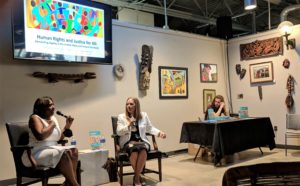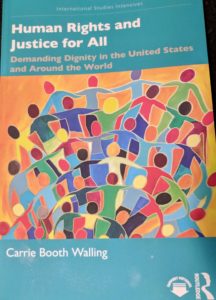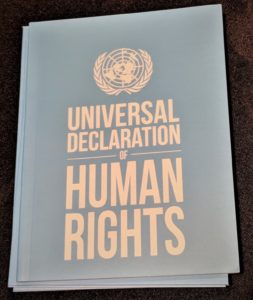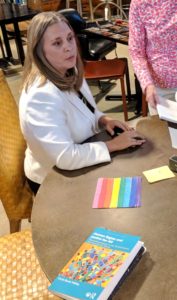By Paul Rozycki
Carrie Booth Walling introduced her new book “Human Rights and Justice for All: Demanding Dignity in the United States and Around the World” at a well-attended kickoff event Thurs. Aug. 11, at Totem Books in Flint.

Moderator Dawn Jones asked Walling a series of questions and fielded questions from the audience. (Photo by Paul Rozycki)
Dawn Jones of ABC 12 TV conducted the interview and was moderator as Walling discussed the book and answered questions from the audience about the importance of human rights in today’s world. Both were introduced by former Flint Mayor Dayne Walling. Carrie Walling said she was inspired to work for the cause of human rights as a result working for women’s rights and learning of the wars in Yugoslavia and Rwanda, during her undergraduate years in the 1990s.
She also said that “all should have human rights, even those who don’t seem to deserve them”. In that light, Walling discussed her role in Albion College’s Prison Exchange Program that works in partnership with Jackson Prison, to aid those who are incarcerated.
In her interview Dawn Jones said that the last chapter of the book, “The Toolkit” was most impressive to her. That chapter offers suggestions of how one could get involved in meaningful efforts to protect and defend human rights in many situations. Walling said that many of her students played a role in creating the chapter and offering suggestions for taking action.

Cover of Walling’s book. (Photo by Paul Rozycki)
In response to several questions from the audience, Walling drew a connection between the Flint Water Crisis and a range of human rights abuses around the globe, saying that “water is a human right” that should be protected world-wide, and that Flint’s water crisis arouse from a denial of basic democratic rights.
Others asked about how the discussion of human rights in class has changed the beliefs of Walling’s students and how one should balance rights with responsibilities. She said that ironically, we think about human rights less in those places where they are most respected.
“Human Rights and Justice for All”
In the book Walling examines the range of human rights around the world, details the many violations that have taken place, reviews the leaders in the effort to protect human rights, and most importantly, offers a toolkit with suggestions for those who seek to be involved in the protection of human rights both domestically and internationally.

Audience members listen in as Walling discusses her new book. (Photo by Paul Rozycki)
While Walling’s focus is often on the international aspect of human rights violations and the response to those violations, she brings the issue home to Flint readers with a significant discussion of the Flint Water Crisis as an example of human rights violation that reflect similar violations around the world.
Universal Declaration of Human Rights
The book begins with an extensive definition of human rights, based largely on the United Nations Universal Declaration of Human Rights (UDHR) which was adopted in 1948. The 30 basic rights set out in the UDHR are the basic definition of human rights but they also have become the basis for expanding that definition as societies change and respond to those changes.

Cover of the Universal Declaration of Human Rights. (Photo by Paul Rozycki)
In the first chapter, Walling makes the point that human rights need to be protected by all governments, both those that are democratic and those that are authoritarian. She notes that not all democratic governments protect human rights and not all authoritarian governments violate them. Throughout the book, Walling cites individuals who have defended human rights, both in the U.S. and abroad.
Equality and non-discrimination
She argues that equality and non-discrimination should be a fundamental requirement of any nation’s human rights policy and outlines the violation of human rights that have taken place with the Uyghurs in China, as well as systematic racial discrimination in the United States, particularly in the area of law enforcement, with the George Floyd case as a prime example.
The Flint Water Crisis and the interdependence of human rights
Walling points out that while there are extensive lists of human rights, they are all interdependent and linked together — and cites the Flint water crisis as an example. She says, “The Flint Water Crisis (US) demonstrates how the violation of political rights in Flint, Michigan led to the violation of the right to water which threatened the right to life and health. Those right were compounded by the preexisting racial, economic and environmental disparities—violations of the right to non-discrimination.

Flint Water Tower (Photo by Tom Travis)
The fight for clean water in Flint, then, is directly related to the struggle for democratic governance, fundamental equality, and justice.” Walling draws parallels with the Yankton Sioux nation’s fight against the Dakota Access Pipeline, and on the international scene with a discussion of ISIS and its use of sexual violence against women.
International crimes
International crimes such as genocide are examined as the book turns to the cases of Rwanda and Syria and those nations’ actions against their own people. Walling highlights the definitions of genocide, crimes against humanity, and war crimes and outlines the actions that can be taken in forums such as the International Criminal Court.
She writes, “Protecting international human rights in an international system designed around state sovereignty poses significant challenges for enforcement, even against international crimes that are so egregious that they are universally prohibited. The commitment to protect populations from genocide, crimes against humanity, and war crimes has grown alongside the human rights project; but norms of protection remain far ahead of practice.”
Moving beyond atrocity
While criminal courts can take action to punish those responsible for genocide, crimes against humanity or war crimes, healing a society can be a more challenging process. The next chapter of the book examines the ways in which various nations have attempted to heal after living through an atrocity.

Walling signing her book at the book release event at Totem Books. (Photo by Paul Rozycki)
Walling examines the Truth and Reconciliation Commission in South Africa, a similar commission in Greensboro, North Carolina, Argentina’s human rights trials, and the Srebrenica Genocide Memorial — all as ways of healing a nation after an atrocity.
Organizations to protect human rights
In the next chapter Walling reviews some of the major organizations, both within the United Nations and beyond, that have worked to protect human rights around the world. She also highlights some of the individuals who have played a major role in defending human rights in their nations and the political strategies that have worked to protect those rights. She says “In practice, effective human rights change often relies on the interaction of multiple actors, mechanisms, and approaches operating at the local, national, regional and international levels.”
The Human Rights Toolkit
The chapter that received the most attention at the Totem book event was the Toolkit that offers specific advice on how to work for and organize in order to protect and defend human rights. The Toolkit was prepared by Carrie Walling with assistance from several of her students. It describes how individuals can take action in two major ways.

Retired educator Betty Ramsdell asks a question to Walling. Moderator Dawn Jones (left) Flint Board of Education candidate Dylan Luna (right). (Photo by Paul Rozycki)
First, it outlines how an individual can become a better human rights defender, such as writing opinion/editorial articles, communicating with elected officials, as well as developing personal qualities that make for an effective human rights defender.
Second, it describes the ways in which one can organize in a public protest on campus or elsewhere. The chapter outlines how to present a message, reach out to the media, use social media, and utilize non-traditional methods such as art of theater to reach to public.
Walling says, “The human rights advocacy toolkit aims to help readers avoid becoming bystanders to injustice by offering tools and strategies for defending human rights in their communities, and organizing with others for collaborative, human rights-inspired change.”
Carrie Booth Walling is a professor of political science and faculty director of the Gerald R. Ford Institute for Leadership in Public Policy and Service at Albion College. This is her second book. More information is available at www.humanrights.albion.edu
The book is available from Routledge Books, www.routledge.com
EVM Political Writer and Reporter Paul Rozycki can be reached at paul.rozycki@mcc.edu.


You must be logged in to post a comment.